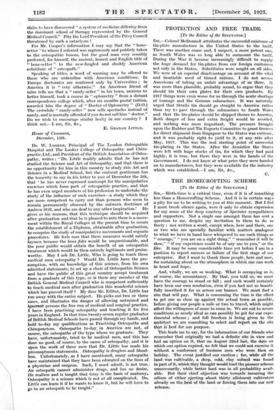PROTECTION AND FREE TRADE
[To the Editor of the SPECTATOR.] Sm,—Colonel McDonnell attributes the successful existence of tin-plate manufacture in the United States to the tariff. There was another cause and, I suspect, a more potent one, as South Wales was so long able to surmount the tariff. During the War it became increasingly difficult to supply the huge demand for tin-plates from our foreign customers not only in the States. Substitutes were sought on all sides, We were at an especial disadvantage on account of the vital and insatiable need of tinned rations. I do not accuse Americans of taking an unfair advantage of us there. It was more than plausible, probably sound, to argue that they should tin their own plates for their own products. By 1917 things were even worse for us through the acute shortage of tonnage and the German submarines. It was naturally urged that Straits tin should go straight to America rather than try b pass through the submarines to South Wales and that the tin-plates should be shipped thence to America. Both danger of 'loss and extra freight would be avoided, and nothing was more important. The pressure brought upon the Rubber and TM Exports Committee to grant licences for direct shipment from Singapore to the States was extreme, and it was probably right to yield to it, at any rate after May, 1917. This was the real starting point of successful tin-plating in the States. After the Armistice the States were left with huge stocks of tin, for which they had paid highly, it is true, but there they were in the hands of the Government. I do not know at what price they were handed on to manufacturers, but they were available for the industry which was establiShed.—I am, Sir, &c.,
C.






































 Previous page
Previous page